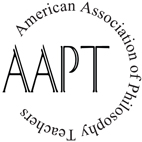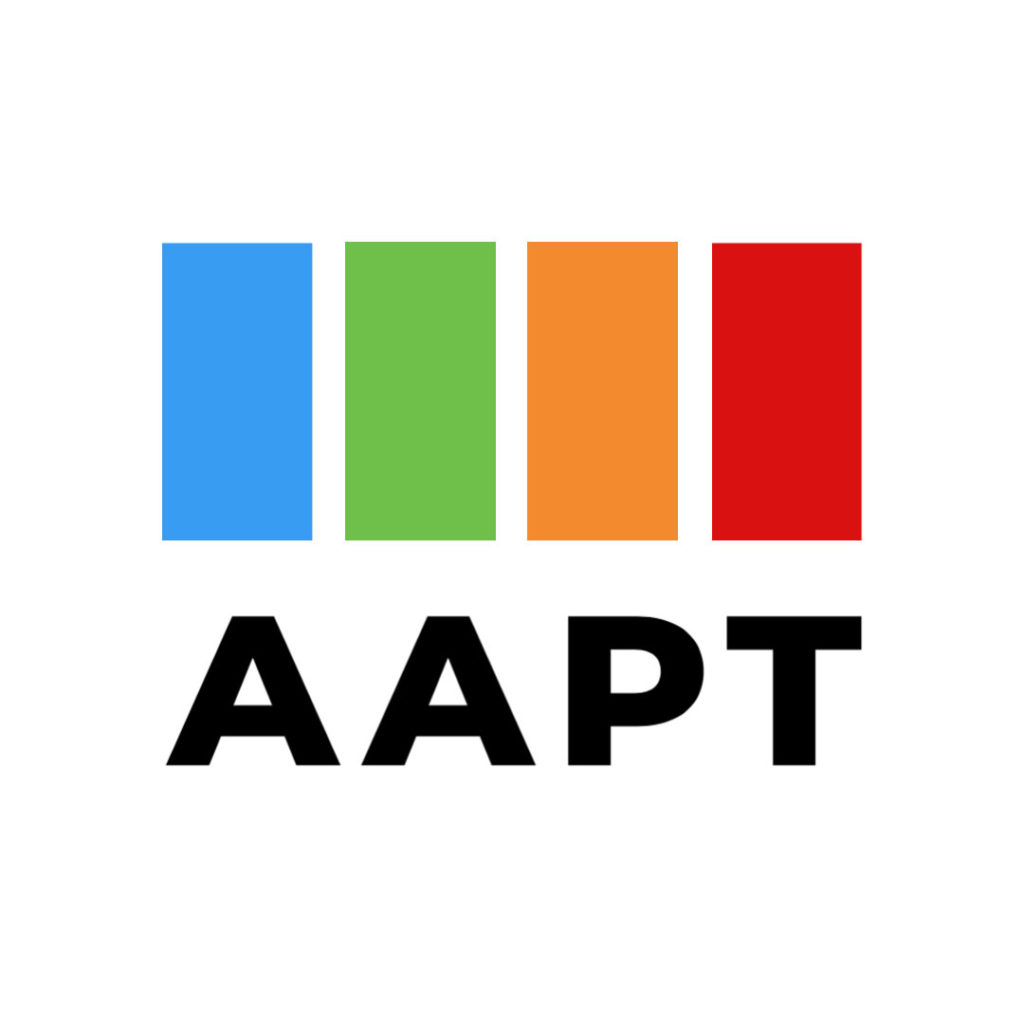Register for Talking/Teaching Sessions

Talking/Teaching: Weekly chats about philosophical teaching, brought to you by the AAPT Teaching & Learning Committee. Join us for weekly conversations about teaching. Each week a facilitator will give a brief introduction to a pedagogical concept or topic, and then participants will be invited to discuss the topic in with others who are interested in improving their teaching, too!
You do not need to be a member of the AAPT to attend; registration is free.
Fill out the form to register and to receive login info for the sessions.
One submission of the form is valid for all of the sessions listed below.
 https://forms.gle/JJjBEdqmAWQonD6S7
https://forms.gle/JJjBEdqmAWQonD6S7
Talking/Teaching Schedule for Spring 2023
(all sessions are scheduled for one hour)
(a summary/abstract of each session is below the list of dates)
- 2/6 (noon EST) David W. Concepción, Ball State University,
Whose Fun? Which Learning? - 2/13 (3pm EST) Guy Crain, Rose State College,
Ideas for Experiential Learning in the Classroom - 2/20 (noon EST) A.G. Holdier, University of Arkansas,
Structural Engagement and Revolutionary Syllabi - 2/27 (3pm EST) Renée Smith, Coastal Carolina University,
Promoting Self-Regulative Practices in Philosophy Classes - 3/6 (noon EST) Merritt Rehn-DeBraal, Texas A&M University-San Antonio,
Navigating the Ethical Costs of Education in Philosophy Classrooms - 3/13 (3pm EST) Cassie Finley, University of Iowa,
Teaching and Doing Philosophy as Virtuous Dialogue - 3/20 (noon EST) Mike VanQuickenborne, Everett Community College,
How do we prevent learning loss due to AI text generators? - 3/27 (3pm EST) Mark Battersby, Capilano University and Sharon Bailin, Simon Fraser University,
Beyond Informal Logic: Teaching Critical Thinking as Inquiry - 4/3 (noon EST) Yvette Pearson, Old Dominion University,
Title TBA - 4/10 (3pm EST) Chris Blake-Turner, University of Alabama at Birmingham,
Deadlines and Non-Ideal Pedagogy
Summary of Sessions
2/6 (noon) David W. Concepción, Ball State University, Whose Fun? Which Learning?
Thesis (from a learning theorist): “Fun is highly instrumental to motivation, and thus learning.” Negatively, other things being equal, if students aren’t having fun in your class, they aren’t learning as much as they could. Positively, only if you make yourself, your assignments, and your course culture fun, are you able to inspire maximal learning.
Objection (from a philosophy professor): “I am not an entertainer, and college courses are not play time. My job is not to provide fun experiences.” One might argue, “I can inspire maximal learning without being fun because ____.”
Analysis (from Dave Concepción): “You’re both right.” There is a distinction between professors and entertainers, and there are many senses of fun. But maximal learning does require fun and the best teachers bring the fun in some sense. Which sense ought you?
In this facilitated conversation, we’ll think together about the intersection of fun, teaching, and learning. I’ll take attendees through a workshop activity about fun, and then we’ll discuss each other’s questions and thoughts.
2/13 (3pm) Guy Crain, Rose State College, Ideas for Experiential Learning in the Classroom
While experiential learning has pedagogical benefits over traditional lecture and even discussion teaching formats, philosophy can be a difficult field in which to envision experiential learning-based lesson plans. I aim to briefly introduce experiential learning and describe two specific lesson plans I use in my logic classroom: (1) a visual, auditory, gustatory, and proprioceptive illusions station-based approach to challenging students’ folk views about their perception and perceptual beliefs, and (2) an amazing race-based approach to propositional logic to get students to experience the tension between thinking fast and slow. I will encourage contributions from others with regards to experiential learning-based approaches to traditional philosophical topics in the classroom as well as ways to avoid pitfalls when experimenting with experiential learning lesson plans in the classroom.
2/20 (noon) A.G. Holdier, University of Arkansas, Structural Engagement and Revolutionary Syllabi
This facilitated discussion aims to focus on the relationship between student engagement and syllabus design beyond considering creative options for assessment/grading techniques. In the session, I’ll share my experiences with co-creating course syllabi with students themselves, particularly by selecting reading/discussion topics based on their interests and expanding/varying content modalities based on what they find most accessible.
2/27 (3pm) Renée Smith, Coastal Carolina University, Promoting Self-Regulative Practices in Philosophy Classes
This session will be a discussion of promoting students’ self-regulative practices in philosophy classes. Self-regulation, which is the core component of Self-Regulation Theory (SRT) (Bandura 1991), is an umbrella concept that includes the more familiar concepts of metacognition and reflection as well as “…the monitoring and managing of one’s cognitive processes as well as the awareness and control over one’s emotion, motivations, behavior, and environment as related to learning” (Nilson, 2013, p. 5). Self-regulating learners deliberately manage their learning behaviors and environments. Self-regulation techniques help learners engage in distinct steps in the learning process from planning and goal setting, to monitoring and self-evaluation, and reflection and self-correction. Instructors can provide distinct self-regulative activities in their classes or incorporate self-regulating activities into content-related assignments. This session will introduce the concept of self-regulation, the benefits of helping students cultivate self-regulative practices, and some examples of assignments and activities that promote self-regulation. Participants will then discuss activities they have or could use in their classes to promote student learning by making self-regulation a distinct student learning outcome.
3/6 (noon) Merritt Rehn-DeBraal, Texas A&M University-San Antonio, Navigating the Ethical Costs of Education in Philosophy Classrooms
Philosopher Jennifer Morton has argued that there are often ethical, and not just financial, costs to attending college, and that these costs tend to be experienced most acutely by first-generation and low-income college students. These costs can include strain on relationships with friends and family and loss of community and identity. As philosophy instructors, while we can’t eliminate these costs for students, I believe that we do have tools at our disposal to help students articulate and think through how they are navigating these ethical costs. In this session, we will discuss ways that we have or can bring consideration of the ethical costs of college into philosophy classrooms.
3/13 (3pm) Cassie Finley, University of Iowa, Teaching and Doing Philosophy as Virtuous Dialogue
Either explicitly or implicitly, we communicate ideas about the value and nature of philosophy to our students whenever we teach philosophy classes. Expanding upon work in educating for intellectual virtues, in this session we will discuss concrete ways that instructors can use a virtue dialogue framework to cultivate and communicate the importance of virtues through teaching philosophy. Because we want to be able to have good–or virtuous–dialogues not only with people who communicate in the same ways we do, but with those who have different backgrounds, beliefs, and values, students see the value in reading and really working hard to understand different philosophical ideas because they see the value in practicing understanding other’s ideas both for their own sake, for the sake of better understanding other points-of-view, and also to develop the corresponding virtues required for having good dialogues. Using a virtue dialogue framework with concrete virtues corresponding to better ways of engaging with others and the world can be a tool for instructors to motivate their students to engage with course content, praise students for doing well in precise language, give specific feedback on ways for students to improve in their interactions with others, and also guide instructors in how they can improve their own engagements with their students.
3/20 (noon) Mike VanQuickenborne, Everett Community College, How do we prevent learning loss due to AI text generators?
I will briefly present the power of ChatGPT 3.5 by sharing my screen and plugging typical philosophy short essay question prompts into ChatGPT 3.5. Then we will discuss suggestions as to how to deal with its impact on student learning. I have at least one helpful approach for how to counteract students’ use of ChatGPT 3.5 to plagiarize their responses, but as this discussion is so new, it will be wide open for all to contribute.
3/27 (3pm) Mark Battersby, Capilano University and Sharon Bailin, Simon Fraser University, Beyond Informal Logic: Teaching Critical Thinking as Inquiry
In this session, we will propose for discussion the idea that we should refocus the goal of teaching critical thinking from a defensive one (i.e., learning not to fall prey to invalid, inadequate, or fallacious arguments – an informal logic approach) to coming to reasoned judgments on issues (an inquiry approach). We shall offer ideas for discussion about how one might teach critical thinking for reasoned judgment using an inquiry approach.
4/10 (3pm) Chris Blake-Turner, University of Alabama at Birmingham, Deadlines and Non-Ideal Pedagogy
There are two immediate questions here. First, how can we make our deadlines more learner-centered? Deadlines often do not receive the level of thought that we put into other areas of syllabus planning. If they did, what would deadlines look like? Second, how can we balance the demands of learner-centeredness with the non-ideal realities of our pedagogical situations? Suppose learner-centeredness would have it that complete flexibility throughout the semester is the way to go. But suppose also that, because you’re teaching 5 classes, you just need to stagger your grading load somewhat. How should we balance these demands? This is, of course, a question that goes beyond deadlines.
Fill out the form to register and to receive login info for the sessions.
One submission of the form is valid for all of the sessions listed above.
 https://forms.gle/JJjBEdqmAWQonD6S7
https://forms.gle/JJjBEdqmAWQonD6S7
Please direct inquiries to Kimberly Van Orman,
chair of the Teaching and Learning Committee, at
teaching-learning@philosophyteachers.org


